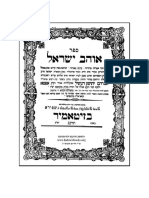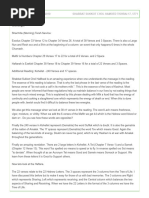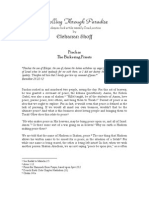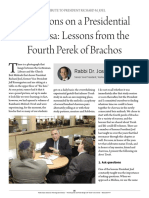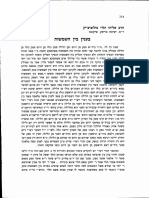Likutei Ohr: A Publication of YULA Boys High School
Uploaded by
outdash2Likutei Ohr: A Publication of YULA Boys High School
Uploaded by
outdash2,In Memory of Mr. Max Glass -.$% ('/ "0&1 !
( %#230 &'$01 +*&
0n Memory of Mr. Jack Gindi !"#" $"%&' !( $"%&' ()*% +*&
Likutei Ohr
Volume II : Issue XIV
!di"r-in-Chief: #riel Amse$em 15 %enior Edi"r: !itan Meisels 15 &ichael Somekh 15 &anaging Edi"rs: Jack Levkowitz 17 !itan Tennenbaum 17 'ayout Edi"r: (air Fax 14 &arke)ng: (osef Hier 16 #sher Naghi 14 *is+ibu"rs: &itche$ Silberberg 14 &ichael Lazovsky 14 Jordan Lustman 15 %ta, Advisor: -abbi Arye Su.i/
The Pamphlet of Light
Parshat Beshalach
A publication of YULA Boys High School!
3$' %4$)%&
Rabbi Aaron Gartner
20/20 Hindsight
The Flame of Our Ancestors
If you believe breaking is possible, believe fixing is possible. - Rabbi Nachman of Breslov
1e2$ah Gems
(osef Petlak 17
Every morning, just before the silent Shemonah Esrei, we say, With a new song the redeemed ones praised Your Name at the seashore. All of them in unison gave thanks, acknowledged Your sovereignty, and said Hashem Yimloch L'Olam Vaed. Why do we refer to this song of praise at the Sea of Reeds as a new song? When describing the Egyptians death at the Yam Suf, the Pasuk writes, Deep waters covered them. They descended in the depths like stone [K'Even] (Shemot 15:5). Rashi mentions that we are taught elsewhere that the Egyptians sank K'Oferet- like lead (Shemot 15:10). In still a third place, Shemot 15:7, the Torah writes that, Yachleimo K'Kash- they were consumed like straw. Lead is a very heavy metal and thus sinks more quickly than stone. Straw is a light material, which first floats and then slowly sinks. These three verses seem to inherently contradict each other. Rashi explains that the each of these three Pasukim describe the fate of three different types of Egyptians. Some drowned slowly like straw; others drowned more quickly, sinking like stones; still others drowned almost immediately, sinking like lead. A slower fall meant a slower, more painful death. These three levels of drowning represented the three different levels of wickedness found amongst the Egyptians. Their deaths correspond with the way each treated the Jews during the slavery in Egypt. We learn the following lesson from this Rashi: even during the troubling times in Egypt when it seemed as if HaKadosh Baruch Hu was ignoring Bnei Yisroel, He was actually watching them quite closely. He never forsakes His people even in the time of their worst suffering. Even then, He sits in Heaven and keeps score. He remembers which Egyptians are horrible to the Jews, which are decent to them, and which are kindest to them. Although it may sometimes appear otherwise, G-d never abandons us; G-d is always very much interested in what happens to Klal Yisroel. When the Jews look back after crossing the Sea of Reeds, and they see the Egyptians drowning--some in a more painful fashion and some in a less painful fashionthey suddenly get it. They understand that Divine Justice is being administered. They understand that Hashem is very much aware and very much in charge at every single moment of every waking day. Therefore, they are able to express a new level of insight into their song. Usually, we think of a song as praise for the nice things that HaKadosh Baruch Hu has done for us. However, the new song was not only as thanks for their salvation, but rather it involved praise to Hashem that even in the worst times of enslavement, He was still caring about us. I believe that I was recently sent a friendly reminder of this lesson. I was praying very hard for particular circumstances to improve; however, I was not seeing any change. Deep down it bothered me, Does Hashem not see how sincerely I am praying? Then came my wake up call. My fourteen-month-old baby was getting into a really bad habit of waking up in middle of the night and crying until we would take him out. I decided that on the next night we would let him cry it out a little in the hope that he would learn to go back to sleep. The next night I found myself looking into the eyes of my son who was in his crib screaming and waiting for me to take him out. And then it hit me! He must be wondering, Does he not hear me screaming? Why is he not taking me out? I got the message loud and clear. Just like I heard my beloved sons cries, and it was for his benefit that I did not take him out, so too Hashem loves us and always hears our cries. If we are not answered right away, it is for a good reason.
Pirkei Avot, a collection of truths from the Rabbis of the Tanaic Period, contains a great many lessons on the topic of Torah. Surprisingly, there are few Mishnayot that address the theme of Tefillah. Over the next couple of weeks, we will focus on the few Mishnayot that do. In the 18th Mishnah of the second Perek, Rabbi Shimon says, Be meticulous when reading the Shmah and in Tefillah. Tefillah here refers to Shemonah Esrei. The Tosfot Yom Tov comments that these two components of Davening are particularly important because they represent our acceptance of HaKadosh Baruch Hus kingdom, a focal point of our prayers; therefore, we must be more careful with these prayers. Rashi points out that this Mishnah is teaching us the importance of saying Shmah at the right time. Interestingly, Rashis Girsah of the Mishnah did not mention the Shemonah Esrei. The latter idea that the Mishnah discusses concerns the manner in which people pray: Do not make your Tefillah the same but rather ask for mercy and plead before Hashem. The Bartenurah stresses that when people pray in a supplication for mercy, Hashem responds immediately. We can learn from this Mishnah that if we are sincere in our Tefillah, our prayers will surely be answered.
Tell Them the Torahs Truth
Ariel Amsellem 15, Editor-in-Chief
The most prominent event in this weeks Parsha is certainly Hashems miraculous parting of the Yam Suf. After Klal Ysroel successfully passes through the two edifices of water abreast to them, Hashem brings the water crashing down on the Egyptians in his final climactic punishment on this nefarious people. The path from this point in Bnei Yisroels story leads directly to Matan Torah in Yitro, next weeks Parsha; however, before the Jews can reach Har Sinai another people, the nation of Amalek, try to preclude the imminent transfer of the Torah. The Lubavitcher Rebbe, Rabbi Menachem Mendel Schneerson, points out that Hashems philosophies when managing these two threats are quite different and, some may say, antithetical. When the Egyptians are chasing Bnei Yisroel, the Torah writes, The Lord will fight for you, but you shall remain silent (Shemot 14:14); yet, Klal Yisroels strategy when fighting Amalek is go out and fight against Amalek (Shemot 17:9). The glaring question arises: why does Hashem command Am Yisroel to battle with Amalek when He had just saved them from the equally dangerous Egyptians with a miracle. The Rebbe states that there is a key difference between these two dangerous peoples, which determined the strategy Hashem used to defeat them. The Egyptians came from behind the Jews; this hazard did not block Bnei Yisroels path to Har Sinai. Amalek, on the other hand, stood between Am Yisroel and the receiving of the Torah. For that reason, the Jews had to employ every faculty of theirs to defeat Amalek. In fact, Amalek had and has always stood for the eradication of Torah, which made them into the archenemy of Klal Yisroel throughout our nations history. Amalek has never had a real opposition to the nation of the Jews, but rather the book of truth that they profess. In the face of a foe that wishes to obliterate the Torah, Hashem commands that we must fight to the nail to preserve the holiest of texts. Even though Jews are not known, and should not be known, as a people who use violence as a means of achieving their goals, in a scenario where Torah is in jeopardy such an option must be considered and, in select cases, utilized. This message is extremely applicable to our people today. We live in a world of assimilation and acculturation. Our brothers and sisters continue to leave the faith and ignore the virtue of the Torah because others seem disprove its veracity. However, if we counteract these opponents who wish to sequester the Torahs truth with every resource we have and found ourselves on the basis of Emunah in Hashem and the Torah, we will be successful in keeping our people together.
Halachic Illuminations
From Rabbi Nachum Sauer
If a man is given a food that has a pleasant aroma, which gives him a craving, he must immediately give some of it to the attendant who served him the food. It is an act of piety to give the attendant some of every type of food that is brought to the table. The Mishneh Berurah adds that the aroma could even be a food with a sharp or sour taste. The reason a person must offer a portion is because it is painful for the server to watch the consumer eat something when the server craves it. However, it is sufficient to only give the attendant a little since so that his desire will be satisfied. The Mishneh Berurah admonishes that every food, not only aromatic foods, should be given to the attendant, for when a person cannot eat food that is right before him, he will be pained that he cannot partake. It is forbidden to give an attendant a piece of bread unless one knows the server will wash his hand before ingesting it. Likewise, it is forbidden to give food to someone to eat unless you know that person is going to make a Bracha on it. A person may not give food to the attendant as long as the server or the head of the household is holding a glass in his hands. The Mishneh Berurah explains that the reasoning behind this is that the attendant may become preoccupied with the food and spill the contents of the glass. Similarly, the head of the house may become irritated when seeing someone give food to the attendant and spill the contents of his glass out of anger. Such an occurrence would create an embarrassing situation for either the attendant or the head of the household, which the Halacha tries to avoid.
Compiled By Jesse Hyman 16
What Do You Mean It Is Bitter?
Sammy Schoen 17
In this weeks Parsha, Parshat Beshalach, Hashem preforms multiple miracles on behalf of the Bnei Yisroel: He splits the sea so that the Bnei Yisroel can cross it while Egyptian cavalry drowns in the Jews tracks. Bnei Yisroel sing out and praise G-d with the prayer of Az Yashir. After this, Bnei Yisroel enter the land of Marah. Here, the Jews complain to Moshe: they say that the water is bitter and not fit for drinking. Moshe responds by throwing a branch into the water, and Hashem miraculously makes the water sweet. The Kotzker Rebbe writes that the water was not actually bitter at all. The Bnei Yisroel complained not because the water was bitter, but because they themselves were bitter. One explanation of the Kotzker Rebbes Chidush is that they were complaining just to complain. Maybe, one of the reasons they cried out is because when they cried out for redemption in Egypt, HaKadosh Baruch Hu listened. They may have thought that this was the only way they could acquire what they needed and wanted. Others interpret this section as a test from G-d. After witnessing all of Hashems miracles in Egypt and at the splitting of the Yam Suf, Bnei Yisroel had Emunah in Hashem. This generation is described as the holiest generation in all of Jewish history. Hashem wished to test the Bnei Yisroel by making their Yetzarim HaRaim, evil inclinations, stronger and stronger, and then he would see if they would maintain their righteousness. This was a hard test for Bnei Yisroel, and they ultimately failed when they complained to Moshe. Conquering ones Yetzer HaRah is possibly the biggest challenge of this world as can be seen by this story. A third explanation of why Klal Yisroel complained is that they saw such great miracles up until this point that they thought that they would be supplied with water through another miracle. They thought Moshe and Hashem would do everything for them throughout their journey into Eretz Yisroel. Hashem was sending them a message that they had to prove themselves. We can learn many a lesson from all of these interpretations. One of the most important is gratitude, Hakarat HaTov, one of the hardest Midot to display since we must be thankful for so much around us. We should take a moment every day to think of how many advantages we have rather than looking to all the negatives in our lives as the Bnei Yisroel did. Next time, when someone does a Chessed for us, we must make it a point to thank him or her.
(ULA Boys High School Nagel Family Campus 9760 W. Pico Blvd. Los Angeles, CA 90035 Tel: 310.203.3180
You might also like
- Ohev Yisroel by Opter Rav Avraham Yehoshua Heschel of Apt, MezibuzNo ratings yetOhev Yisroel by Opter Rav Avraham Yehoshua Heschel of Apt, Mezibuz13 pages
- Lessons Learned From Conversion: Rabbi Zvi RommNo ratings yetLessons Learned From Conversion: Rabbi Zvi Romm5 pages
- Likutei Ohr: A Publication of YULA Boys High SchoolNo ratings yetLikutei Ohr: A Publication of YULA Boys High School2 pages
- Likutei Ohr: A Publication of YULA Boys High SchoolNo ratings yetLikutei Ohr: A Publication of YULA Boys High School2 pages
- Likutei Ohr: A Publication of YULA Boys High SchoolNo ratings yetLikutei Ohr: A Publication of YULA Boys High School2 pages
- Parshas Parah and Why We Read It: by Ariel Sacknovitz, 11th GradeNo ratings yetParshas Parah and Why We Read It: by Ariel Sacknovitz, 11th Grade6 pages
- Likutei Ohr: A Publication of YULA Boys High SchoolNo ratings yetLikutei Ohr: A Publication of YULA Boys High School2 pages
- Seven Dangers: A Revelational Insight Into Seven Sinful Acts Often Overlooked By Today’s BelieversFrom EverandSeven Dangers: A Revelational Insight Into Seven Sinful Acts Often Overlooked By Today’s BelieversNo ratings yet
- Likutei Ohr: A Publication of YULA Boys High SchoolNo ratings yetLikutei Ohr: A Publication of YULA Boys High School2 pages
- Likutei Ohr: A Publication of YULA Boys High SchoolNo ratings yetLikutei Ohr: A Publication of YULA Boys High School2 pages
- Tales of Tikkun: New Jewish Stories to Heal the Wounded WorldFrom EverandTales of Tikkun: New Jewish Stories to Heal the Wounded WorldNo ratings yet
- Likutei Ohr: A Publication of YULA Boys High SchoolNo ratings yetLikutei Ohr: A Publication of YULA Boys High School2 pages
- Kosher Movies: A Film Critic Discovers Life Lessons at the CinemaFrom EverandKosher Movies: A Film Critic Discovers Life Lessons at the CinemaNo ratings yet
- The Story Behind The Laws: 29 Shevat, 5777/february 25, 2017 Parshat Mishpatim/Shekalim Vol. 8 Num. 25No ratings yetThe Story Behind The Laws: 29 Shevat, 5777/february 25, 2017 Parshat Mishpatim/Shekalim Vol. 8 Num. 254 pages
- Parsha Potpourri: Pesach - Vol. 6, Issue 30No ratings yetParsha Potpourri: Pesach - Vol. 6, Issue 304 pages
- M M M M T T T T: Evaser Evaser Evaser Evaser OV OV OV OVNo ratings yetM M M M T T T T: Evaser Evaser Evaser Evaser OV OV OV OV5 pages
- Don't Outsmart The Torah: by Eitan Lipsky, 12th GradeNo ratings yetDon't Outsmart The Torah: by Eitan Lipsky, 12th Grade6 pages
- Rise To The Occasion: by Moishy Rothman, Editor of Student Articles, 12th GradeNo ratings yetRise To The Occasion: by Moishy Rothman, Editor of Student Articles, 12th Grade8 pages
- Likutei Ohr: A Publication of YULA Boys High SchoolNo ratings yetLikutei Ohr: A Publication of YULA Boys High School2 pages
- Jewish Times - Volume I, No. 11... April 19, 2002No ratings yetJewish Times - Volume I, No. 11... April 19, 20024 pages
- A Night of Questions: Rabbi Zev ReichmanNo ratings yetA Night of Questions: Rabbi Zev Reichman3 pages
- The Light Within Our Darkness: Chanukah: The Holiday of FaithNo ratings yetThe Light Within Our Darkness: Chanukah: The Holiday of Faith8 pages
- The Wicked Gatherer: Volume XIV - Issue 23 The DRS Weekly Torah PublicationNo ratings yetThe Wicked Gatherer: Volume XIV - Issue 23 The DRS Weekly Torah Publication12 pages
- Likutei Ohr: A Publication of YULA Boys High SchoolNo ratings yetLikutei Ohr: A Publication of YULA Boys High School2 pages
- Cleansing Before Hashem: by Yoshi Block, 12th GradeNo ratings yetCleansing Before Hashem: by Yoshi Block, 12th Grade6 pages
- Tisha Be'Av: Shabbat Devarim Shabbat 28 July 2012 9 Ab 5772No ratings yetTisha Be'Av: Shabbat Devarim Shabbat 28 July 2012 9 Ab 57725 pages
- Likutei Ohr: A Publication of YULA Boys High SchoolNo ratings yetLikutei Ohr: A Publication of YULA Boys High School2 pages
- The Matan Torah Narrative and Its Leadership Lessons: Dr. Penny JoelNo ratings yetThe Matan Torah Narrative and Its Leadership Lessons: Dr. Penny Joel2 pages
- The Meaning of The Menorah: Complete Tanach)No ratings yetThe Meaning of The Menorah: Complete Tanach)4 pages
- The Surrogate Challenge: Rabbi Eli BelizonNo ratings yetThe Surrogate Challenge: Rabbi Eli Belizon3 pages
- Lessons From Mount Sinai:: The Interplay Between Halacha and Humanity in The Gerus ProcessNo ratings yetLessons From Mount Sinai:: The Interplay Between Halacha and Humanity in The Gerus Process3 pages
- Consent and Coercion at Sinai: Rabbi Dr. Jacob J. SchacterNo ratings yetConsent and Coercion at Sinai: Rabbi Dr. Jacob J. Schacter3 pages
- Why Israel Matters: Ramban and The Uniqueness of The Land of IsraelNo ratings yetWhy Israel Matters: Ramban and The Uniqueness of The Land of Israel5 pages
- Performance of Mitzvos by Conversion Candidates: Rabbi Michoel ZylbermanNo ratings yetPerformance of Mitzvos by Conversion Candidates: Rabbi Michoel Zylberman6 pages
- I Just Want To Drink My Tea: Mrs. Leah NagarpowersNo ratings yetI Just Want To Drink My Tea: Mrs. Leah Nagarpowers2 pages
- Shavuot To-Go - 5777 Mrs Schechter - Qq4422a83lNo ratings yetShavuot To-Go - 5777 Mrs Schechter - Qq4422a83l2 pages
- Flowers and Trees in Shul On Shavuot: Rabbi Ezra SchwartzNo ratings yetFlowers and Trees in Shul On Shavuot: Rabbi Ezra Schwartz2 pages
- Chag Hasemikhah Remarks, 5777: President Richard M. JoelNo ratings yetChag Hasemikhah Remarks, 5777: President Richard M. Joel2 pages
- What Happens in Heaven... Stays in Heaven: Rabbi Dr. Avery JoelNo ratings yetWhat Happens in Heaven... Stays in Heaven: Rabbi Dr. Avery Joel3 pages
- Reflections On A Presidential Chavrusa: Lessons From The Fourth Perek of BrachosNo ratings yetReflections On A Presidential Chavrusa: Lessons From The Fourth Perek of Brachos3 pages
- Experiencing The Silence of Sinai: Rabbi Menachem PennerNo ratings yetExperiencing The Silence of Sinai: Rabbi Menachem Penner3 pages
- Kabbalat Hatorah:A Tribute To President Richard & Dr. Esther JoelNo ratings yetKabbalat Hatorah:A Tribute To President Richard & Dr. Esther Joel2 pages
- José Faur: Modern Judaism, Vol. 12, No. 1. (Feb., 1992), Pp. 23-37No ratings yetJosé Faur: Modern Judaism, Vol. 12, No. 1. (Feb., 1992), Pp. 23-3716 pages
- Ibn Ezra On Exodus - English Translation - PlainNo ratings yetIbn Ezra On Exodus - English Translation - Plain33 pages
- The Sin of The Spies Lusting For Leadership by Rabbi Tzvi PittinskyNo ratings yetThe Sin of The Spies Lusting For Leadership by Rabbi Tzvi Pittinsky13 pages
- Ten Steps To A Healthy Relationship: Pesach To Shavuot: Mrs. Mindy EisenmanNo ratings yetTen Steps To A Healthy Relationship: Pesach To Shavuot: Mrs. Mindy Eisenman5 pages
- The Staff of Moses: Awesome Reason Save Study Speak Gathering Study First HebrewNo ratings yetThe Staff of Moses: Awesome Reason Save Study Speak Gathering Study First Hebrew18 pages
- Psalms 27 and 72: Revealing The Light and Chesed of YHWHNo ratings yetPsalms 27 and 72: Revealing The Light and Chesed of YHWH42 pages
- Rabbi Kalonymus Kalman Shapira - Experiencing The Divine, A Practical Jewish Guide PDFNo ratings yetRabbi Kalonymus Kalman Shapira - Experiencing The Divine, A Practical Jewish Guide PDF86 pages
- The Purpose of The Makkot (Plagues) : Teida" ("In Order That You Know") Are DeployedNo ratings yetThe Purpose of The Makkot (Plagues) : Teida" ("In Order That You Know") Are Deployed4 pages
- Why Break The Tablets?: Rabbi Shmuel GoldinNo ratings yetWhy Break The Tablets?: Rabbi Shmuel Goldin5 pages
- Coming Clean: Taught by Rabbi Moshe Yoseph KoniuchowskyNo ratings yetComing Clean: Taught by Rabbi Moshe Yoseph Koniuchowsky5 pages
- The Hatan Damim Episode: A Preamble To Yetziat Mitzrayim: Mrs. Rivkah KahanNo ratings yetThe Hatan Damim Episode: A Preamble To Yetziat Mitzrayim: Mrs. Rivkah Kahan6 pages
- Moshe Rabbenu at Ma'amad Har Sinai: Ascending and Descending The MountainNo ratings yetMoshe Rabbenu at Ma'amad Har Sinai: Ascending and Descending The Mountain8 pages
- Likutei Ohr: A Publication of YULA Boys High SchoolNo ratings yetLikutei Ohr: A Publication of YULA Boys High School2 pages
- Shaar HaEmunah Ve'Yesod HaChassidut - en - Merged - Plain100% (1)Shaar HaEmunah Ve'Yesod HaChassidut - en - Merged - Plain159 pages
